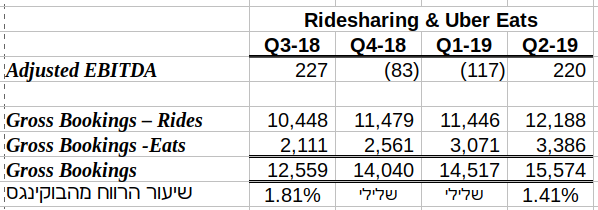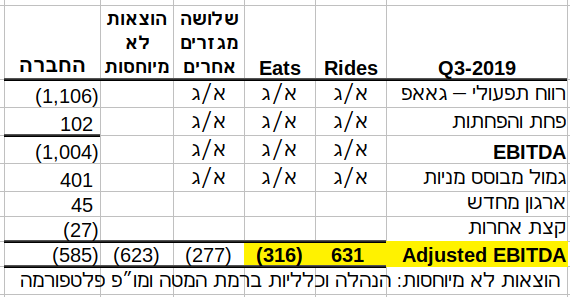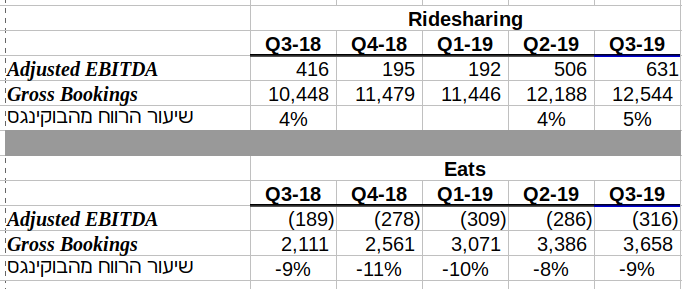כידוע, או כזכור לכם מפוסטים קודמים על Uber, כאן, אובר נתנה בתשקיף גילוי רבעוני מלא הן להכנסות של Uber Eats (גאאפ ונונ-גאאפ) והן ל"גרוס בוקינגס", שזה מה שהצרכן משלם לארוחה ולהובלה, יחדיו (ראו פרטים בפוסט הזה).
אבל, כפי שכתבתי באותו פוסט, התשקיף לא נתן גילוי על מדד רווח עבור עסקי אובר איטס, משום שלצורך הדיווח המגזרי על פי GAAP, אובר כללה את Uber Eats ואת Ridesharing באותו מגזר:
כידוע (כתבו על זה המון בכלכלונים בעברית, לרבות בהקשר אסם, כאן למשל), האופן שבו חברה מגדירה את הפילוח המגזרי לצרכי דיווח למשקיעים, תלוי קריטית בדוחות הפנימיים המוגשים למנכ"ל (מדי שבוע, חודש או רבעון), או למישהי אחרת שהחברה טוענת שהיא Chief Operating Decision Maker, או בקיצור CODM (אחראית על הקצאת משאבים וכו'). אם היא לא מתעניינת ולא מקבלת דיווחים על רווח של תחום פעילות מסוים, אז אותו תחום לא יחשב למגזר והמשקיעים לא יקבלו מידע על מדד רווח לאותו תחום.
סגל ה-SEC שבדק את טיוטות התשקיף של אובר תהה כיצד ייתכן שמנכ"ל אובר לא מקבל דיווח על רווח המופק ממשלוחי ארוחות להבדיל מרווח המופק מהסעת נוסעים. כבר במכתב ההערות הראשון הוא העלה שתי שאלות, שעליהן ענתה החברה, באמצעות עורכי דינה, באריכות (כאן, שו"ת 34 ו-35). בין השאר, דרש ה-SEC תיאור והסברים לעניין הבא:
ו-Uber השיבה בלי למצמץ, באמצעות עורכי דינה, כי המנכ"ל לא מקבל דיווחים על הרווח בתחום הארוחות ולא עם הרווח בתחום נסיעות; הוא מקבל אך ורק דיווח על הרווח המצרפי:
הנה האיבידה המתואמת של מגזר Ridesharing & Uber Eats מאז הרבעון השלישי אשתקד ועד רבעון שני השנה:

ואז, כאילו משום מקום, בדוחות הרבעון השלישי כתבה החברה כי המנכ"ל התחיל להתעניין ברווח פחות מצרפי:
אז עכשיו החברה זיהתה חמישה מגזרים נפרדים, ביניהם מגזר נפרד לנסיעות ומגזר נפרד לארוחות -- וכעת האיבידה המתואמת מדווחת לנסיעות לחוד ולארוחות לחוד:

על המספרים האלה, אמר המנכ"ל, בגאווה:
האנליסטים שמחים וצוהלים. increased transparency around the business units is a step in the right direction, כתבו האנילסטים של וודבוש. new segment financials are helpful to understanding the business, כתבו האנליסטים של ברקלייס. וברוח חגיגית זו, Uber העלתה לאתר קשרי המשקיעים שלה, כאן, את המספרים הדיס-אגרגטיביים עבור כל רבעון מאז Q1/18. הנה הם מאז Q3/18:

ומי אחראי לפסטיבל השקיפות הזה? במילה אחת: WeWork. מי מאיתנו לא ראה כותרות כגון זו ב-CNBC, כאן:
מנכ"ל אובר עצמו, Dara Khosrowshahi, עשה שימוש במילת הבאזז PATH, בכנס דילבוק, שנערך בשבוע שעבר (כאן):
כלומר, היה ברור כי בשיחת הועידה על תוצאות הרבעון השלישי, אנליסטים יבקשו לדעת מה התכנית של ההנהלה בעניין המסלול לרווחים -- והמנכ"ל ידע שבלתי אפשרי לנהל שיחה אינטלגנטית על המסלול, מבלי לתת גילוי נפרד על פרופיל הרווחים/הפסדים בתחום הנסיעות וגילוי נפרד על הפסדים/רווחים בתחום משלוחי ארוחות.
זאת במיוחד לאור עובדה שאחת הסיבות לכשלון הנפקת וויוורק הייתה אי מתן גילוי נפרד, בטיוטות התשקיף, לפרופיל הרווחים בערים הוותיקות, כגון אלה שבהן היא פועלת מאז 2011, לעומת אלה שבערים שאליהן היא נכנסה רק לאחרונה (ראו כאן).
מה שמעצים את הקשר בין נסיגת וויוורק מהנפקה לבין הדוחות האחרונים של Uber הוא כי גם האחרונה, החל מיום רביעי האחרון מחפשת משקיעים חדשים, שיחליפו ותיקים שיוצאים. כמתואר כאן:
בשיחת הועידה עצמה (תמליל), המנכ"ל וה-CFO הסבירו כי נדבך מרכזי במסלול יהא יציאת Eats מערים, שבהן אין סיכוי להפקת רווחים. נראה כי לא היה דוח אנליסט אחד שלא הדהד את הנתונים על 15%|50% שחשף סמנכ"ל הכספים בשיחה, ועל הנחישות של ההנהלה להוציא את Eats משווקים תחרותיים מדי:
פוסט זה משויך לקטגוריה "כללי (לא מסווג)".
תגיות לפוסט זה: UBER | WeWork |